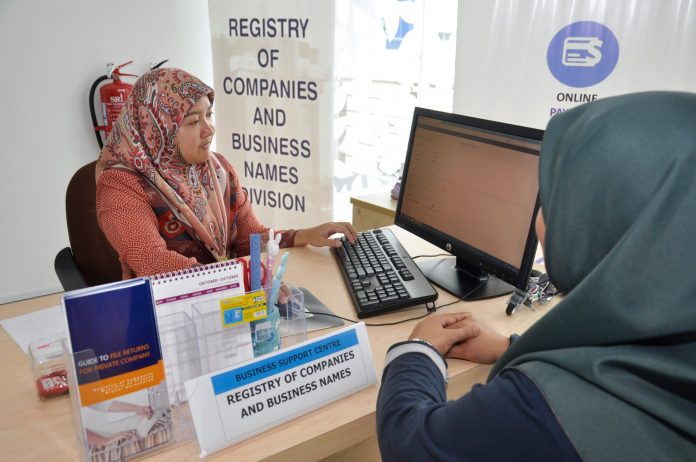Thinking about registering a business in Brunei? You can now do so online, in as short as a day, with the Registry of Companies and Business Names of the Ministry of Finance (ROCBN).
Registering provides the base for the most fundamental recognition for your business, and is the first step towards legalizing your operations and finances.
Through www.roc.gov.bn, one can register by first creating an account, then filling out an application, uploading the relevant documents, clicking submit and making your payment.
Once approved, an email will be sent to the applicant confirming the registration, attached with a digital certificate of your business’ registration.
But before you register, you’ll have to decide first on what type of business entity to register as – and each type bears different implications and carries different requirements.
Here’s a simplified outline.
Sole-proprietorship
A business owned by one person – that person being 18 years or older, and a citizen or permanent resident of Brunei. Arguably the simplest form of a business (entity), sole proprietorships are quick to set up, carry less administrative duties and do not pay corporate tax.
However they are not a separate legal entity – meaning the owner (and not just his business) is personally responsible for any and all debts, losses or legal action taken against the business.
Partnership
A business owned between two to 20 people. Partnerships share the same benefits of proprietorships, as they are not required to pay corporate tax. However, like proprietorships, they carry the same risks – the business itself is not considered an entity separate from the individual.
Therefore partners in the businesses are all personally and equally responsible for debts or losses to the business. Partnerships are also only open to citizens and permanent residents of Brunei.
ROCBN processes sole-proprietorships and partnerships as business names, which legally falls under the Business Names Act (Cap. 92).
If you’re interested in setting up or transitioning your business to be its own legal entity, then incorporating a company is the next step.
Company
Given the advantages of a proprietorships and partnerships, especially their status of operating without having to pay corporate tax, why would one consider setting up (incorporate) a business as a company instead?
Generally, companies are required to pay 18.5% of their income to the government (which entails filing your annual returns. Read more here). However, incorporating and operating as a company offers significant advantages: they carry stronger corporate governance and are more transparent, which boosts credibility.
Practically, this translates to being able to enter into opportunities typically only open to companies; these can include high-level industry tenders or contracts as well as investment and financing opportunities which can take the business to the next level.
Another important distinction for a company is that it is its own legal entity, which means that as long as the company complies with corporate regulations, owners are able to protect their personal assets against liabilities such as debts.
The ownership of companies comes down to its shareholders. Legally, within the Companies Act (Cap. 39), these are recognized by the company issuing a share certificate recognising the amount of share ownership.
Shareholders do not necessarily have to be responsible for day-to-day operations, in the same way that sole-proprietorships and partnerships are (since all documentation in the latter businesses are all under their personal names).
A company also needs to have at least two directors, one of which must be either a citizen or permanent resident of Brunei or an Ordinarily Resident within Brunei. The term ordinarily resident applies to those actively living within Brunei (the definition and application process of which you can read here.)
Private or public?
The next step is to consider what type of company you are looking to incorporate as. There two main types of companies in Brunei; the more common private limited company (Sendirian Berhad) and the public company (Berhad).
The main difference is in shareholder size; private companies have at least two shareholders and a maximum of 50 shareholders, while a public company must have at least seven shareholders and can certainly have more than 50 shareholders.
As their title implies, private companies are privately held, while a public company is one that has sold or is selling itself to the public. Public companies have the advantage of being able to raise money for expansion and projects by selling stocks or bonds to the public.
In recent years, there have been a reductions in documents required to incorporating a company: notice of situation of registered office form, returns of allotment of shares, submission of statutory declaration, stamping the share certificates and the Memorandum and Articles of Association, a document detailing the profile of the company, its objectives and rules and regulations.
To incorporate a company, you will need a signed copy of the directors’ identity cards or foreign directors’ passports, their consent form to act as directors, a list of directors’ particulars called Form X and a Memorandum and Articles of Association. The full process can be found here.
What’s next?
Some businesses need to have letter of approval from the regulating authorities, before being registered or incorporated. As an example, if you’re looking to register to open a health clinic, you would need approval from the Ministry of Health first.
There’s a business license simulator which you can access here, which will tell you what regulations govern certain business sectors.
For more information, visit www.mof.gov.bn, www.business.gov.bn, www.roc.gov.bn. You can also visit ROCBN at Level 1, Island Block, Ministry of Finance Building, Commonwealth Drive, BB3910, Brunei Darussalam or the ROCBN desk at the Business Support Centre, 1st Floor, Design & Technology Building, Simpang 32-37, Kg Anggerek Desa, Bandar Seri Begawan, BB3713.












